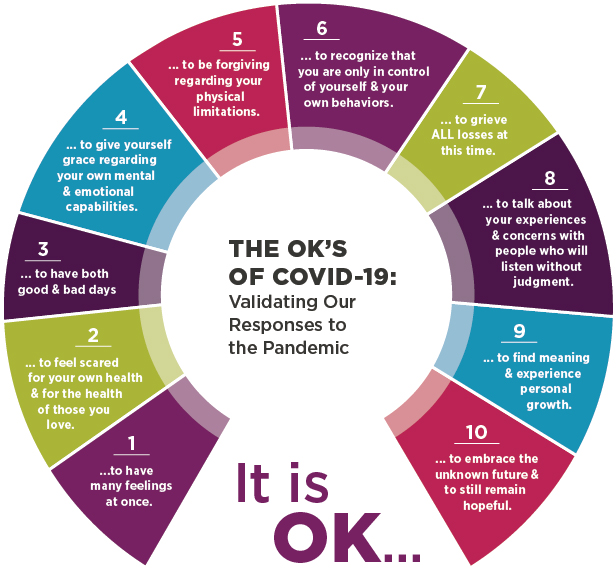The OK’s of COVID-19: Validating Our Responses to the Pandemic

1. It is OK to have many feelings at once.
On any given day, you may experience a multitude of feelings, such as feeling overwhelmed by all of the daily changes, angry at cancelled events, disappointed by missed opportunities, sad that you cannot spend time with family and friends, wary when you cross someone at the grocery store, or too exhausted to even get out of bed. These feelings you are having are normal and natural. What is most important is that you cope with them by not hurting yourself or others. As strong as a feeling may be, feelings do change.
2. It is OK to feel scared for your own health and for the health of those you love.
Perhaps you have an underlying health disorder. Perhaps you have elderly parents or grandparents. Or perhaps you or a loved one is working on the front lines. This may be the first time in your life that you have faced your own mortality, or perhaps it is triggering feelings from prior losses you have already experienced. Concerns for your health and/or loved ones’ health are legitimate.
3. It is OK to have both good and bad days.
Some days, the gravity of the situation feels overwhelming. You see ongoing news headlines of increased infections and deaths, you struggle to find basic needs at the grocery store, you get distracted with school and work obligations, you experience financial stressors, and you worry about the future. This is a hard day, you’re struggling, and your outlook is bleak. The next day, you may feel better. Maybe a family member or friend reached out, you see neighbors helping neighbors, you listen to your favorite music, you enjoy nature or turn to your higher power through prayer. This is a good day. Regardless of which type of day you are having, it is OK. Being human has its peaks and valleys.
4. It is OK to give yourself grace regarding your own mental and emotional capabilities.
Everyone’s experience with the pandemic is unique. Some are losing jobs, some are juggling working from home while managing children and schooling. Some are working the front lines of the pandemic as essential workers. Regardless of your situation, you may be feeling overwhelmed by the ongoing changes to your schedule/routine. You may feel that as soon as you start to accept and understand a change, you are hit with yet another blow, such as extended social distancing guidelines, stay-at-home orders, or an unexpected financial loss. Although you strive to do well and be productive, the stress of this new normal may be taking a toll on your productivity. Be patient with yourself and others as these uncharted waters are being navigated. If needed, reach out to mental health professionals for assistance. Seeking assistance is not a sign of weakness but rather of strength.
5. It is OK to be forgiving regarding your physical limitations.
The mental stressors of the pandemic can be seen in physical ways. You may find that you are eating and sleeping more or less compared to before the pandemic. You may find yourself sluggish, or perhaps you have more energy than before. You may find your heart and head racing at times and/or experience headaches or stomach aches. You may find yourself reaching for an extra glass of wine or beer. You may be finding it difficult to stay on track with healthy eating and exercise goals. All of these responses are normal in times of increased stress and grief. Strive to find balance and utilize healthy coping skills, but be kind to yourself when you go off course.
6. It is OK to recognize that you are only in control of yourself and your own behaviors.
You may notice that others are not following social distancing guidelines, such as still having family gatherings or meeting up with friends. While the majority of people are dealing with the pandemic the best way they know how, some people are in denial, which is a common grief reaction. They are unable to recognize the importance of social distancing for themselves and for others. Although this can be frustrating, it is important to recognize that you can only control your own behaviors.
7. It is OK to grieve ALL losses at this time.
There are many individuals struggling with unimaginable losses at this time, such as the complete loss of income or the death of a loved one. Without discrediting a loss of this nature, it is important to recognize that all losses, regardless if society considers them to be small or large, can cause people to grieve. Some people may have been looking forward to walking across the stage at graduation, or cheering on their team at their first-ever professional sporting event, or marrying their best friend in front of all of their loved ones. Suddenly, these events have been postponed or may never happen. Allow yourself and others to grieve.
8. It is OK to talk about your experiences and concerns with people who will listen without judgment.
You may find that your family members or closest friends are not able to offer you a listening ear at this time. Maybe their hardships are “worse” than yours and you feel guilty sharing about something they would deem as trivial. Or maybe they would prefer to just not talk about things and to keep moving forward. Regardless, it is important to find someone you can talk to, whether that be another family member or friend or an online support group, where you feel heard and understood.
9. It is OK to find meaning and experience personal growth.
Although unplanned, the pandemic may have created the opportunity for you to slow down in life, to appreciate sit-down meals with family, to find gratitude in the little things, or to reevaluate your own goals for the future. Perhaps you have more time to read a book or develop a new hobby. Maybe you find ways to help your community by making masks, giving blood, or finding new volunteer opportunities.
10. It is OK to embrace the unknown future and to still remain hopeful.
The future is certainly unknown at this point. Will we ever return to the way things used to be or will we have a “new normal”? When can we resume our daily activities without fear or hesitation? These are questions that we may be grappling with for some time, but the most important thing to remember is although the situation is open-ended, it is temporary. It is OK to still dream and to be hopeful for a better future.
“As a society we have experienced an exorbitant amount of loss in a very short period,” shares Healing Patch Coordinator Melody Ray. “I am referring to not only losses to death but the multitude of other losses the virus has inflicted – loss of income, loss of milestone events, loss of predictable routines. Individuals living alone or in a long-term care facility are longing for physical touch from loved ones. The list goes on and on, not to mention feelings of loss of security, trust and what we knew as normalcy.
“I feel we at the Healing Patch have an obligation to help the community identify the multitude of emotions that they are having as normal and natural and to put a word to what they are experiencing – grief. Our hope is that by reading these 10 OK’s of COVID-19, you feel validated in your experience and that you allow more patience for yourself and others.”
Children’s Grief Services
The Healing Patch continues to support grieving children and families during the pandemic with different opportunities for connection.
“We wanted a way to capitalize on all of the extra time children are spending with their families,” says Shalen Steinbugl, Healing Patch Volunteer Coordinator/Grief Specialist. “We came up with the idea of ‘Time Together Tuesdays.’ We hope these activities are helpful to not only children who are grieving the death of a loved one, but also to children who are grieving everyday losses that have occurred because of the pandemic.”
“Time Together Tuesdays” include various activities, mostly general and some related to grief and loss, using common household items. Activities are shared on the Healing Patch Facebook page.
In addition to weekly activities, the Healing Patch continues to take calls from the community concerning the best ways to support a grieving child(ren), enroll interested families into the program and mail grief resources. Anyone interested in becoming a volunteer is encouraged to go through the initial steps to apply, as volunteer training is slated to begin in July.
For more information about services or volunteer opportunities, please visit the Healing Patch Facebook page or call 1-800-445-6262.
 Melody Ray has been working with the Healing Patch Children’s Grief Program since 2012 and currently serves as Healing Patch Coordinator. She has a Bachelor’s degree in social work from Saint Francis University and Master’s degree in social work from the University of Pittsburgh. In addition to attending various grief and loss trainings and webinars, Melody works firsthand with many local grieving families by companioning them and learning from their grief experiences.
Melody Ray has been working with the Healing Patch Children’s Grief Program since 2012 and currently serves as Healing Patch Coordinator. She has a Bachelor’s degree in social work from Saint Francis University and Master’s degree in social work from the University of Pittsburgh. In addition to attending various grief and loss trainings and webinars, Melody works firsthand with many local grieving families by companioning them and learning from their grief experiences.
 Shalen Steinbugl, Volunteer Coordinator/Grief Specialist at the Healing Patch Children’s Grief Program, began working with the Healing Patch in September 2019. She received dual bachelor’s degrees in Psychology and Health Communication with a minor in Spanish from Juniata College.
Shalen Steinbugl, Volunteer Coordinator/Grief Specialist at the Healing Patch Children’s Grief Program, began working with the Healing Patch in September 2019. She received dual bachelor’s degrees in Psychology and Health Communication with a minor in Spanish from Juniata College.







